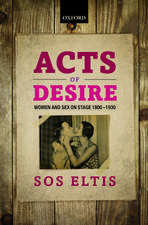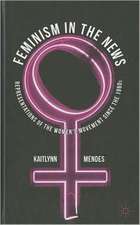Mobilizing Piety: Islam and Feminism in Indonesia
Autor Rachel Rinaldoen Limba Engleză Paperback – 3 oct 2013
| Toate formatele și edițiile | Preț | Express |
|---|---|---|
| Paperback (1) | 239.56 lei 31-37 zile | |
| Oxford University Press – 3 oct 2013 | 239.56 lei 31-37 zile | |
| Hardback (1) | 818.91 lei 31-37 zile | |
| Oxford University Press – 3 oct 2013 | 818.91 lei 31-37 zile |
Preț: 239.56 lei
Nou
Puncte Express: 359
Preț estimativ în valută:
45.84€ • 47.99$ • 37.93£
45.84€ • 47.99$ • 37.93£
Carte tipărită la comandă
Livrare economică 27 martie-02 aprilie
Preluare comenzi: 021 569.72.76
Specificații
ISBN-13: 9780199948123
ISBN-10: 0199948127
Pagini: 272
Ilustrații: 9 illustrations
Dimensiuni: 155 x 231 x 20 mm
Greutate: 0.41 kg
Editura: Oxford University Press
Colecția OUP USA
Locul publicării:New York, United States
ISBN-10: 0199948127
Pagini: 272
Ilustrații: 9 illustrations
Dimensiuni: 155 x 231 x 20 mm
Greutate: 0.41 kg
Editura: Oxford University Press
Colecția OUP USA
Locul publicării:New York, United States
Recenzii
With her book, Mobilizing Piety, Rachel Rinaldo joins a growing and influential subset of social scientists attempting to theorize the intersection of religion and social movements using the lens of Islamic feminist activists in majority Muslim contexts. Rinaldo's excellent work offers both the theoretical and methodological groundwork for such further inquiry into the compatibilities and limits of Islam and female agency in majority Muslim contexts.
Rachel Rinaldo gives us a richly documented and path-breaking study of how Muslim women in Indonesia draw on both Islam and feminism to argue and imagine political and social changes. Her findings go against a pervasive view of the incompatibility of Islam and feminism: she finds that these very diverse global discourses can in fact work together towards desirable political outcomes.
This original study conducted in the world's largest Muslim-majority country strikes me as one of the most interesting and important works on Islam and women in recent years. Rather than pit secularists against religious-minded activists in debates over women's rights, Rachel Rinaldo shows that the major divide in contemporary Indonesia - as in much of the Muslim world - is more complex, and centers on struggles over what it means to be a Muslim, a woman, and an Indonesian.
In this empirically rich and highly readable ethnography, sociologist Rachel Rinaldo shows how Indonesian women activists in four women's organizations -- which she studied between 2002 and 2010 -- negotiate religious norms, gender roles, and the influences of globalization... Rinaldo's unique and outstanding study of the values and actions of four women's organizations in contemporary Indonesia enables the reader not only to gain a deeper understanding of gender and Islamic politics in one country, but also to recognize the variations in women's activism across the globe. The book will be of value to scholars of religion and of women's movements, and appropriate for upper-level undergraduate courses in politics, social movements, and women's studies.
The book is well written and theoretically sophisticated, and it is necessary reading for anyone who studies feminism, globalization, or religion and politics.
Rachel Rinaldo gives us a richly documented and path-breaking study of how Muslim women in Indonesia draw on both Islam and feminism to argue and imagine political and social changes. Her findings go against a pervasive view of the incompatibility of Islam and feminism: she finds that these very diverse global discourses can in fact work together towards desirable political outcomes.
This original study conducted in the world's largest Muslim-majority country strikes me as one of the most interesting and important works on Islam and women in recent years. Rather than pit secularists against religious-minded activists in debates over women's rights, Rachel Rinaldo shows that the major divide in contemporary Indonesia - as in much of the Muslim world - is more complex, and centers on struggles over what it means to be a Muslim, a woman, and an Indonesian.
In this empirically rich and highly readable ethnography, sociologist Rachel Rinaldo shows how Indonesian women activists in four women's organizations -- which she studied between 2002 and 2010 -- negotiate religious norms, gender roles, and the influences of globalization... Rinaldo's unique and outstanding study of the values and actions of four women's organizations in contemporary Indonesia enables the reader not only to gain a deeper understanding of gender and Islamic politics in one country, but also to recognize the variations in women's activism across the globe. The book will be of value to scholars of religion and of women's movements, and appropriate for upper-level undergraduate courses in politics, social movements, and women's studies.
The book is well written and theoretically sophisticated, and it is necessary reading for anyone who studies feminism, globalization, or religion and politics.
Notă biografică
Rachel Rinaldo is assistant professor of sociology at the University of Virginia.











